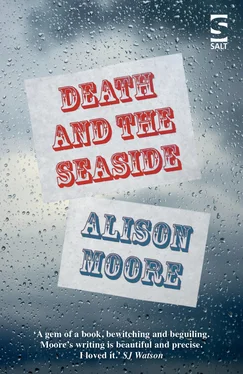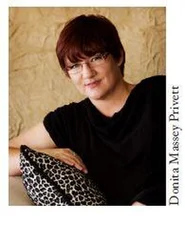She could see, in the middle of the dark windowpane, a smaller, white square. She sat up, peering at it, trying to see what it was: not the moon, a square moon; if she moved her head she could see the moon, a white circle beside the white square, like a geometry test. There was a framed, glazed picture on the opposite wall, but it did not seem to be a reflection of that. Pushing back the duvet, she climbed out of bed and crossed the room without switching on the light. At the window, she reached out and touched the white square. It was a sheet of paper, stuck to the inside of the glass. On it, she thought she saw, despite the darkness, a word: ‘JUMP’. She unstuck the paper from the window, took it over to the desk and switched on the lamp, but when she looked at the paper in the light, she found that there was nothing written on it after all, or else the message had simply vanished, as happened, for example, when she wrote with her finger in condensation on a window, and then the condensation evaporated, leaving behind only a trace of what had been there, the unseen shape of her writing on the glass, and then sometimes it reappeared.
She switched the lamp off again and looked at the page in darkness as before — as if it might be some kind of glow-in-the-dark trick — but still she could see nothing there. She wondered if it was the same piece of paper as the one that had been slipped under her door and then lost; but whether it was the same piece of paper or not, who would or could have stuck it to her window?
Keeping the light off, so that she would not feel exposed to the outside world, she went to her door and opened it, looking out and towards the stairs, but there was no one there. ‘Hello?’ she called, but very quietly. She closed the door again. She went to the wardrobe and flung open the double doors, so that the empty hangers rattled. She got down on her knees and peered under her bed, looking right into the corners. She felt like her own mother trying to prove to her that there were no monsters hiding anywhere in her bedroom. It was really too dark to see clearly though, and she did not turn her lamp on again, and she did not stretch out an arm to feel around in the darkness under the bed.
She screwed up the piece of paper and threw it into the wastepaper basket. She half-expected that in the morning she would not find it in there, that this was only some kind of bad dream or depths-of-the-night confusion. She went back to bed. She thought she might lie awake until it got light, but she must have fallen straight back to sleep because later she woke and it was still dark and there, again, in the middle of the black rectangle of the window, was a small, white square. She wondered if this was one of those dreams that she sometimes got stuck in, which she might ‘wake’ from, and then find that she had only made it into the next part of the dream. Then, when she really did wake up, she could not quite trust it; she could not quite believe in the realness of her life.
She stared at the white square. She closed her eyes for a moment, but when she opened them again she was still in the same dream, or else wide awake. She got up and crossed the room, reaching out for the piece of paper that was stuck to the glass, to unstick it, and found that she could not: her fingers slipped right over it as if it were frozen in ice. The piece of paper was now stuck to the outside of the glass. It was like a blank picture, mounted on the black of endless sky and endless sea; it was like Tom Friedman’s 1000 Hours of Staring , bare paper impregnated with the artist’s purposeful staring, the artwork’s medium listed as ‘stare on paper’; or it was like Gianni Motti’s Magic Ink series of drawings which were done, according to the artist, in invisible ink that had disappeared on completion of the work.
Susan opened the window and peered out, as if she might find some joker halfway down a ladder, or see someone running off down the street, but there was no ladder and nobody running away.
It would not be possible, she thought, for her to reach around to the middle of the outside of the window, so instead she inspected the piece of paper from her side of the glass. There did seem to be something written on it, but it was not quite legible; it was as if the message had been left out in the rain and had all but washed away. But she thought that perhaps she could almost make out one word, or a half-perceived whisper of the word: ‘JUMP’.
Through the open window, she could hear the sea washing in and out, rattling the stones at the shore and dragging the smaller ones out. She could see the dark line that the deep sea made against the night sky, like a streak of black ink on black paper.
She closed the window again. If she’d had curtains she would have drawn them. She went back to bed and lay awake listening, without knowing quite what she was listening for — a creak that might just be this old building settling, some rustling or scratching in a corner that might be mice, a breath that might just be a gust coming in through a gap in the window frame.
The weather had turned warmer, and Bonnie had taken to sitting out in the backyard, a concreted sun-trap, through whose cracks the weeds grew and to whose low end wall the landlady had attached a trellis for clematis and wisteria to climb up.
Bonnie read horror and fantasy novels from the library, and women’s magazines, or she just sat and watched the birds fly overhead, or she watched the clouds change shape as they drifted across the blue sky.
On this particular Saturday, she was sitting out there with Sylvia, both of them in deckchairs. They had slipped off their shoes — Bonnie could see Sylvia’s neatly painted toenails — and they had bared their legs below the knee. Bonnie felt like they ought to be eating ice creams, or fish and chips.
‘I feel like we ought to be able to hear seagulls,’ said Bonnie.
‘It’s possible to buy recordings of seagulls’ cries,’ said Sylvia.
‘Is it?’ said Bonnie.
Having become aware that Bonnie had written a further two thousand words of her Seatown story, Sylvia had been nagging Bonnie to let her read this next instalment, and it had not taken very long for Bonnie to give in. Now Bonnie was waiting for Sylvia to finish reading the new pages, and it felt a bit like lying down while a doctor inspected her soft insides and she waited for it to hurt. In fact, Bonnie had a vague idea that Sylvia had mentioned doing a PhD, in which case perhaps she was a doctor, but either way, she was not a real doctor.
Bonnie could see exactly which line Sylvia was reading — she could hear the sea washing in and out, rattling the stones at the shore and dragging the smaller ones out — because she moved her left thumb down the side of the page as she went, as if she were checking it, looking for errors. Sylvia came to the end of the page and said, ‘Yes, you can get CDs with all sorts of sound effects on.’
Bonnie reached out for her story but Sylvia kept hold of it.
‘Have you ever held a conch shell to your ear to hear the sound of the sea?’ asked Sylvia.
‘I have tried it,’ said Bonnie, ‘but I could never find one that worked.’
‘You know it’s not the shell,’ said Sylvia, looking at her, ‘don’t you?’
‘Yes,’ said Bonnie. She did know that really; she knew that it was all to do with the shutting out of external sounds, and resonance, and that what you heard, that sound of the sea, was partly just the sound of your own blood flowing. But still, she remembered being on beaches, picking up shells and trying them out, wanting to hear the rushing in and crashing and drawing out of the sea, and she never could; she never could hear what everyone else seemed to hear in those shells.
Читать дальше












